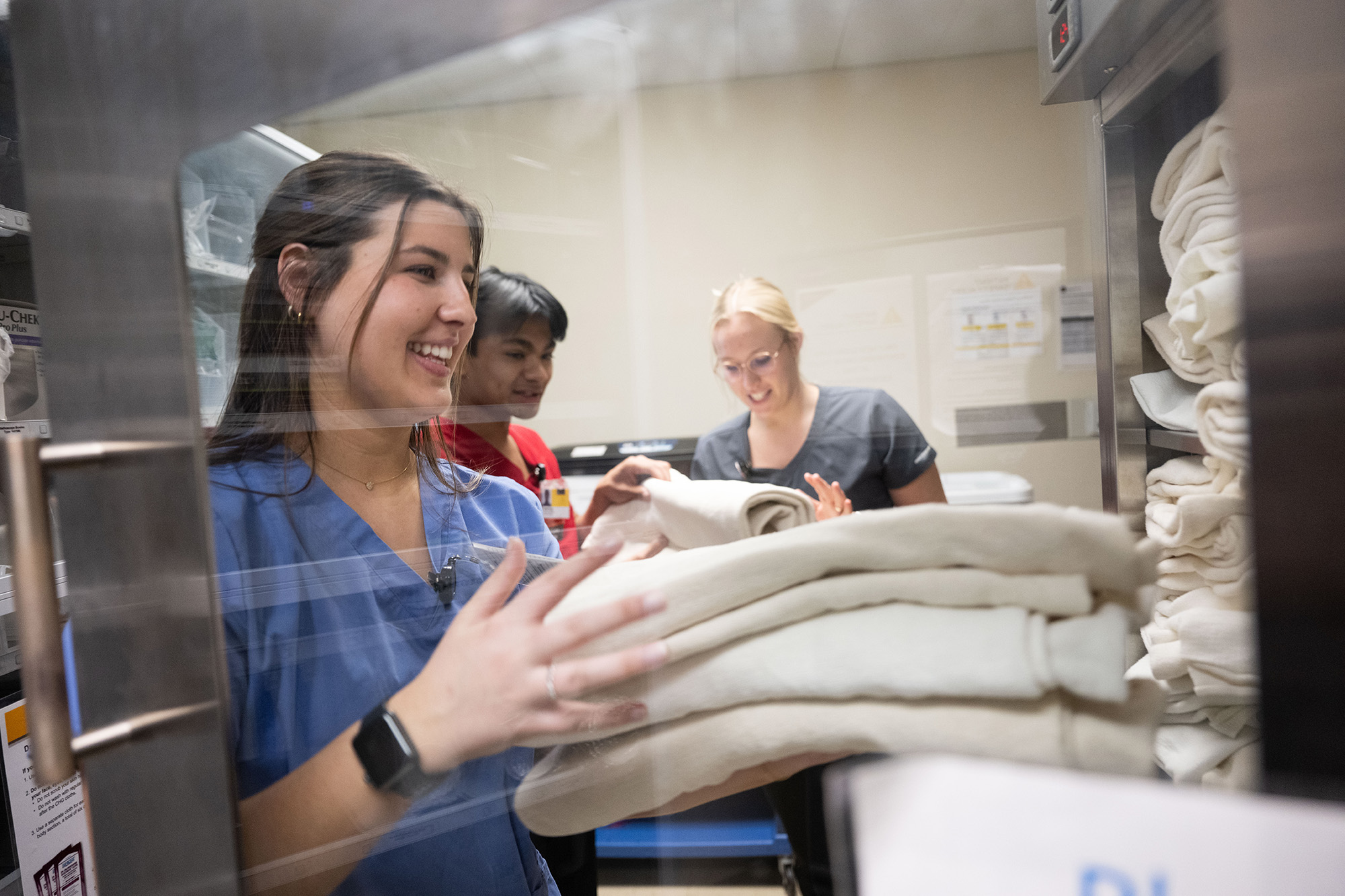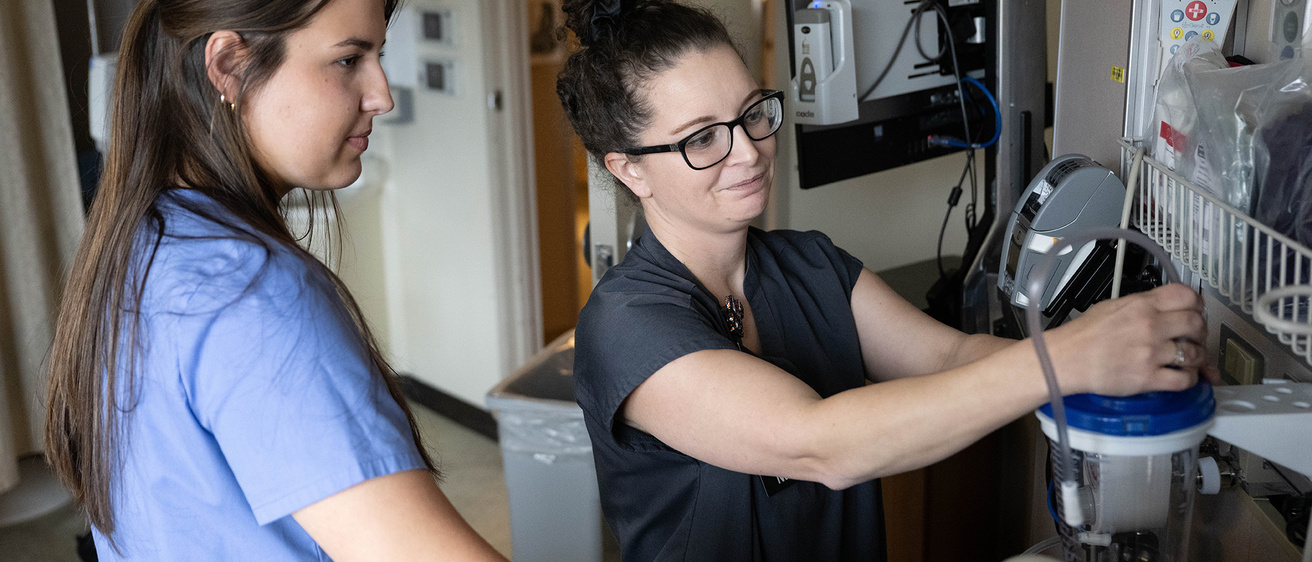The creation of a new University of Iowa Health Care position is giving students invaluable experience while also supporting the workload of hospital staff and enhancing patient care.
Story: Sara Epstein Moninger
Photography: Tim Schoon
Published: Feb 19, 2024
The top photo...
Nurse manager Jessica McDaniel offers instruction to Alana Gratton, a third-year psychology student who works at University of Iowa Health Care as a unit partner. The student role was created in 2022 to assist nursing staff and to expose students to work in a hospital setting.
When Alana Gratton first enrolled at the University of Iowa, she couldn’t decide between a career in occupational therapy or nursing. But working in a student job as a unit partner at University of Iowa Health Care has swayed her.
“I always knew that I wanted to pursue something medical, but being able to see nurses interacting with patients and observe what they do in different situations has been so valuable,” says the third-year psychology major from Dubuque, Iowa. “No two shifts are the same—I leave work every day feeling like I learned something new. I plan on completing a two-year nursing program after I graduate and feel like this role has given me a head start in the field.”
Unit partners provide an extra set of hands to nurses and patient care technicians at the hospital. Under direct supervision and instruction, they assist patients with meal setup and bathing, stock and obtain supplies, take glucose readings, and offer companionship to patients as needed, among many other tasks. After completing training, students work when their academic schedules allow; they are simply asked to put in at least two hours per shift and about eight hours each week.
“No two shifts are the same — I leave work every day feeling like I learned something new. I plan on completing a two-year nursing program after I graduate and feel like this role has given me a head start in the field.”
The idea for the unit partner position was first floated in 2017 by a team of nursing leaders at Iowa, but it didn’t take hold until 2022—when fallout from the pandemic gave it a new sense of urgency. Challenges in recruiting nurses, along with turnover among patient care technicians, required a new strategy. So, the team regrouped, this time partnering with the College of Nursing, and developed an innovative opportunity that would be attractive to students and meet their needs while also alleviating demand on hospital staff.
That spring, a pilot cohort of 18 was hired and trained to work in two inpatient medical-surgical units. In the fall, that number grew to 116 unit partners employed across all divisions of the hospital. To date, more than 200 students have served as unit partners, with more than half deciding to increase their training and transition to the more-independent patient care technician role.
Having students fill these roles is mutually beneficial, says Dan Lose, nursing director of Medical Surgical Services at UI Health Care. Not only has it eased the workload for hospital staff, but the students, many of whom are planning careers in health care, are exposed to work in a hospital setting.
“I think this new role has really helped us provide patient care, but also it allows students to be successful,” says Lose, an Iowa nursing graduate who earned a BSN in 2012 and a DNP in 2016. “Before, some students would start in patient care tech roles and then decide they really didn’t like it and quit after we had invested a lot of time and energy in their orientation. By creating the unit partner role, we are able to get the right people in the right positions.”

Sachin Fong, a UI nursing student who transitioned to a patient care technician role after first serving as a unit partner, enjoys guiding current unit partners like Alana Gratton. He says these student roles in the hospital are invaluable—not only is the scheduling flexible, but students see how health care staff interact with each other and have a chance to develop their own bedside manner.
It appears to be working well. More than 90% of unit partners remain employed at the hospital six months after hire—and staff who initially were skeptical of adding another role to the mix now are asking for more unit partners, says Jessica McDaniel, a nursing practice leader at UI Health Care.
“We’ve received tremendous feedback from our staff about how helpful and beneficial the unit partners are,” she says. “What has surprised me is how much the addition of unit partners to our team has increased our morale and teamwork.”
Another advantage of having these students in the hospital, Lose says, is that it gives UI Health Care a head start on recruiting nursing staff, a challenge facing hospitals across the country.
“Part of our aim is to build relationships with students in the hope that they want to stay in Iowa after graduation,” he says. “We’ve got almost 75 students who have been with us a while now and are close to graduating, so we hope to convert some of them to RN staff.”
Did you know?
The University of Iowa College of Nursing is the smallest nursing college in the Big Ten, and many of its programs are ranked among the best in the nation. Iowa’s BSN program is tied for first among public institutions in the U.S. News & World Report rankings, and four graduate programs are ranked in the top 10.
The unit partner role is not limited to nursing majors, however, Lose says. Students from all majors, especially those in the health sciences, can benefit. Carlie Mather, a third-year psychology major from Cedar Rapids, Iowa, plans to become a counselor and says working as a unit partner, and later as a patient care technician, will make her a better counselor.
“I’ve learned a lot about bedside manner and how to ask questions, and I’m better at reading patients,” she says. “A lot of patients will say that they’re doing OK when they’re not, so I’ve learned how to dig a little bit deeper and help them to advocate for themselves. I’ve also learned how to deescalate situations, which is something I’m likely to do in the psych field.”

Iowa student Alana Gratton (left) works with Sachin Fong, a UI nursing student who transitioned to a patient care technician role after first serving as a unit partner, and staff nurse Brenna Schwenker. To date, more than 200 students have served as unit partners, with more than half deciding to increase their training and transition to the more-independent patient care technician role.
“I’m really proud of this partnership between the hospital and the university. It puts students’ needs first while also considering the needs of staff. But I think the people benefiting from this program the most are our patients. They are getting the care they deserve.”
Although Sachin Fong, a second-year nursing student from Naperville, Illinois, has known since middle school that he wanted to be a nurse, he says the experiences he had as a unit partner—from interacting with the nursing staff, to playing Uno with patients—have been an important part of his education. He even had the opportunity to witness a spinal tap.
“That procedure is not something a unit partner usually is needed for, but I had built a good relationship with the patient just by going in her room and talking to her, and she requested that I sit at her bedside,” says Fong, who was attracted to the job for its flexible scheduling and has since transitioned to a patient care technician role. “It was amazing. I never thought when I applied for the job that I would be experiencing things like a spinal tap. Because I formed a relationship with the patient, I got to witness a procedure that not a lot of people get to see.”
Having the chance to develop his bedside manner boosted his confidence, Fong says.
“Not only is being a unit partner a great way to get your foot in the door, but the experience also teaches you things you can’t learn anywhere else, skills you can apply in any part of your life,” he says. “All the nursing classes that I’ve taken are amazing, but there’s no class that teaches you how to walk into a room and address a patient who may be terminally ill or uncomfortable or afraid. This is a great way to learn those interpersonal skills—and a great way to begin a future career in medicine.”
Want to participate?
Students interested in the unit partner role are encouraged to send inquiries to nursingrecruitment@healthcare.uiowa.edu or contact nursing director Dan Lose at daniel-lose@uiowa.edu.
